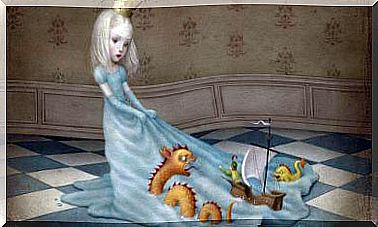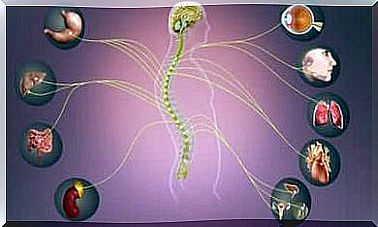Vermiphobia: Fear Of Worms

Vermiphobia, also known as scoleciphobia or helminthophobia, is the intense or irrational fear of worms. It is a phobic disorder: the presence of any stimulus related to the worms triggers a very intense cognitive and physical response.
Although insects are deemed unpleasant by most people, people with vermiphobia can have a panic attack at the very thought. Likewise, the fear of worms is based on or closely related to the parasitic nature of some species.
Some curiosities about the fear of worms
Like all phobias, fear of worms can cause a wide variety of symptoms. These include nausea, dizziness, rapid heartbeat, difficulty breathing or hyperventilation, sweating, muscle tension, etc.
It also often triggers behavioral symptoms, such as avoiding situations in which a worm may be encountered. A person suffering from vermiphobia will try to avoid, for example, planting a plant or going to the countryside.
Perceptual disturbances are also easy to identify; the person may come to believe that they have been contaminated by these animals. This is because vermiphobia has high levels of disgust and fear of being attacked by a potentially harmful parasite. The feeling of being a source of nourishment for these organisms causes a real terror in people with a phobia of worms.
Another very curious fact is that it may also have some connection with the fear of death. Worms can summon the rot of corpses. In this sense, they can be associated with death itself.
Likewise, this phobia is often associated with poor hygiene, which in turn is linked to the transmission of diseases or germs. Thus, vermiphobics are very attentive to personal hygiene and avoid coming into contact with spoiled food.
Causes of vermiphobia
In the case of animal phobias there are several common hypotheses that could explain their origin. On the one hand, fear would be understood as an evolutionary result. Throughout the history of mankind, avoiding certain animals was obviously essential for survival.
In the case of worms and the like, it would have helped us not to eat food in poor condition, thus preventing various diseases. Or it simply protected us from dying from poisoning (millipedes, for example, are poisonous).
In relation to phobias, however, it is inevitable to talk about learning fear through negative experiences. Generally, animal phobias develop in childhood and persist over time. As a result, people who have seen an animal being eaten by worms may have developed vermiphobia. Similarly, this phobia develops after suffering from intestinal worms in childhood.
In addition to these causes, it may also be that the fear of worms was inherited from a parent or family member. That is, when we are children we learn from the reactions and speeches of adults, especially parents. If either of them is afraid of worms, the chances of inheriting it would have been quite high.
How is vermiphobia treated?
Phobias that have a disgust component are more difficult to eradicate, but with the right intervention they can be significantly reduced. For this reason, if fear greatly hinders daily life, it is better to consult a psychologist.
Usually the techniques used to treat this disorder belong to cognitive-behavioral therapy: systematic desensitization, relaxation techniques and cognitive restructuring. The first is an exposure technique which consists in dealing with different stimuli chosen by the patient. This list is sorted according to the intensity of the anxiety provoked, so the patient will be exposed gradually from a lower level of anxiety to a higher one.
There will be relaxation techniques to calm anxious symptoms in all degrees of exposure. Cognitive restructuring, on the other hand, focuses on dismantling irrational ideas about worms and replacing them with other, more adaptive thoughts.
Conclusions
The fear of worms is a source of intense discomfort and can severely limit their daily life. However, with the right intervention and analyzing the causes of fear, fear can be greatly reduced if not eradicated.
The therapeutic path will also provide the patient with the necessary resources to cope with anxiety experienced in other contexts or in relation to other animals.









